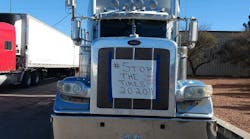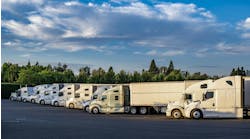"Shut 'em down!"
Talk of a nationwide driver shutdown has been echoing nationwide for years – most notably and recently on social media sites. But these angry words have done little to coalesce truck drivers into a potent force that can bring about the changes they desire.
Empty shelves during the early days of the pandemic brought home to Americans the vital importance of trucking. The consuming public noticed and applauded drivers' selfless sacrifices during the COVID-19 pandemic. Drivers themselves took pride in what many considered their patriotic duty to keep the nation supplied with essentials like food and medicine even while they suffered to find their own meals on the road.
However, despite their service, public accolades, and personal sacrifice, drivers ask: “What do we have to do to get our voices heard?”
Some would say that they have been heard, but to no avail.
"I think they are often heard," explained Steve Viscelli, a former driver and sociologist at the University of Pennsylvania. "We've been hearing about problems, whether it's ELDs, hours of service or other complaints for the last few years. Drivers just don't have the power to influence change the way many of them would like to have," added Viscelli, who authored "The Big Rig: Trucking and the Decline of the American Dream."
"The current situation stands in stark contrast with the history of the industry, which is, without a doubt, a group of workers who were among the most powerful in the entire country,” Viscelli said. “There's no industry where you had a stronger union than the Teamsters. Not only were they strong in the markets where they were present, but markets everywhere."
That was decades ago. The Teamsters in the 1960s, then led by Jimmy Hoffa, not only negotiated rates for their union members but, by default, other drivers as well. The union negotiated The National Master Freight Agreement which set wages and working conditions for truck drivers across the country. Driver pay and benefits were relatively high, solidly middle class, and were often bettered incrementally during subsequent negotiations as a nationwide driver strike was a formidable threat.
This all changed largely due to industry deregulation. Drivers lost their negotiating power as fleets undercut each other to entice shippers to sign on. Ironically, many independent drivers sought deregulation because they wanted to enter new markets and wrangle for higher rates, but deregulation was not always to their benefit.
"I don't think the outcomes were everything they had hoped, but that's a strong example of where owner-operators were able to see the goal that they wanted realized, which was to deregulate the industry," Viscelli said. "Again, for many of them, I don't think it turned out anywhere near what they hoped, but they certainly played an important, at least symbolic role, in representing to Congress and the Carter administration the downsides of regulation for small business truckers."
Now, with about a third of drivers working under their own authority as owner-operators, a nationwide strike or work stoppage by this large segment of the industry is arguably illegal under antitrust laws.
The other impediment to a wide-ranging work action is high turnover in the truckload (TL) sector, a group which often calls the loudest for work actions. New TL drivers, especially, cannot afford to stop working even for a short time. Their pay is lower than most veteran drivers, and some might not want to jeopardize their probationary status. Adding to this is the “de-skilling” of the job which allows fleets to hire less-experienced drivers to take the place of anyone who decides to park their rig in defiance.
"They can just put another ‘meat in the seat,’" a long-haul driver who prefers to go by 'JB,' told American Trucker.
With independents wanting their demands met, truckload drivers putting forth their agenda, and less-than-truckload, package delivery, private fleets and others focused on their particular issues, consensus is challenging to reach.
"I think the main reason why drivers can't execute a work stoppage on a nationwide scale is because the trucking industry is so fragmented," explained Donnie Williams, executive director of the Supply Chain Management Research Center at the Walton College and co-author of the report "Truck Driver Burnout: Ways Carriers Can Fight Stress-Related Turnover."
Williams added that drivers he talks to say they don't want to hurt their fellow citizens but want to strike out at management and government, whom they see as their impediments to higher pay and the freedom to work when and how they want. "In other words, they don't want to be limited by how much they can earn," he said.
However, calling attention to government regulations by rolling slowdowns like one had seen in Indianapolis last year to protest ELDs had the effect of angering some motorists without bringing any regulatory relief. "It just got people pissed off at us," said JB, who was planning to participate but decided at the last minute to continue driving.
"I think what drivers are looking for is more favorable working conditions: More time at home, a company that will give them good routes, the type of routes that they want. I think those are the types of things that truck drivers care about. Pay is obviously there, and it has not kept up with inflation," Williams added.
Another reason for frustration and strike rhetoric is that the job isn't what many newcomers expected. Many rookie drivers feel that the job is not what they envisioned. They thought they would have more freedom, more pay and nobody looking over their shoulder, Williams noted. Moreover, what sounded like a well-suited job turned out to be more difficult than expected. "They're not ready for the loneliness," Williams recalled from his many interviews. "They think they can handle it because, 'Hey, I'll get to see the country. I can do this.' But what we see is that you can't prepare for being by yourself unless you actually experience it. They'll go through the training, they'll get their CDL, they'll do their two, three or four weeks, whatever it is depending on the company, and then all of a sudden they're on their own."
"The frustration [which leads to strike or slowdown talk] has to do with stressors that come with feeling like they're not paid enough and also feeling like they're not respected by other industry partners; these are points of frustration that they can't do anything about,” Williams concluded. “The only control they have is to strike, but only union truckers that can really do that. Drivers feel like they're in a place where they have no control."




